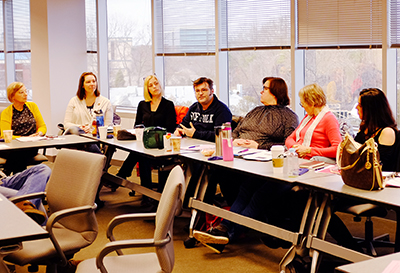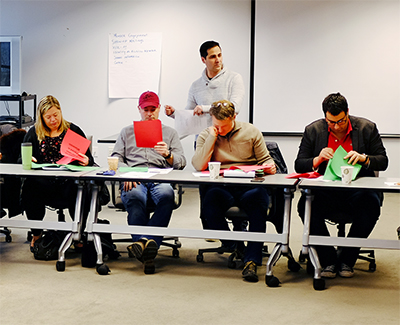| |
 |
| |
Faculty members share ideas during the 3/3 organizing institute. From left are Joan Wozniak, Misty Curreli, Cynthia Eaton, Michael Boecherer, Molly Altizer, Mary Schafer and Andrea Macari. (photo by Dante Morelli) |
During the FA organizing institute on March 3, participants learned about the status and potential impacts of the Janus Supreme Court case and spent a good deal of time examining ways to preserve and shape the future of the FA.
Below are some member reflections on the organizing institute, addressing the Janus case in particular, the future of the FA and why they are sticking with the union.
Matt Zisel, Assistant Professor, Counseling (Ammerman)
- Janus v. AFSCME is a pernicious divide-and-conquer strategy whose telos is to obviate unions and destroy the working and middle class. The Janus argument reasons that fair-share union fees violate members' free speech rights; therefore, a ruling in favor of Janus ensures that we are, as Milton Friedman used to say, "free to choose." On its surface, what could sound more American?
But beneath the surface lies its latent and true purpose: pit members against each other, crush solidarity, weaken the collective, destroy unions and disempower labor. We can't necessarily predict the ripple effects of a decision in favor of Janus, but expect that it will challenge our ability to advocate for the things that matter not only to us but to our students as well.
Therefore, it seems obvious to me that united we stand, divided we fall.
Molly Altizer, Associate Professor, English (Eastern)
- I am sticking with the union for a number of reasons, but some important ones for me are the many financial benefits of union membership. Just this month alone, I purchased car and home insurance at a savings through a union-offered discount with Metlife, I will be receiving a check for the co-pays I made this past year for my medications and I will be getting a new pair of glasses at a significant savings that I would not have without my union membership. On top of this, when I submit my federal taxes in April of this year, I can deduct my union dues.
If I add up the financial benefits, my dues have paid for themselves this year. But more importantly than that, my membership has afforded me many luxuries in the workplace that I did not have when I worked in a right-to-work state. Class size limits, family sick days and personal days were non-existent in my former job. If I had a complaint about the way I was being treated by a boss or supervisor, my only option was to hire a lawyer. I had no chance for tenure, as it did not exist, and due to that I had limited job security.
I am sticking with the union, regardless of the Janus decision, and you should too.
Doug Cody, Adjunct Assistant Professor, Chemistry (college wide)
-
As members of a union, many of us take for granted what our union has been able to negotiate on our behalf. Many adjuncts, like myself, teach at multiple colleges and have little down time to reflect about why it's important to be an actual member of a union. If the Janus decision does make changes or completely strikes down the current ability for all to pay agency fees for representation, then major changes will ultimately occur as the result. It will be subtle at first but eventually all of us will find out that we wished that we tried harder to keep all of us as dues paying members. If the union membership were to drop to less than 50% then decertification would occur and therefore our contracts would be null and void. Salaries and jobs will then be at the whim of the administration, and they most certainly will be offered at a lower salary with no protections. Everyone should understand, therefore, that we need to have a collective voice.
Joan Wozniak, PA II, Media Services (Grant)
-
I think it is vital for FA members to recognize the benefits and circumstances of our employment and how much we owe to our union. It is easy from this vantage point to take for granted our good fortune, to think this is a natural right. We need to acknowledge these circumstances are not ours by chance; union sisters and brothers fought hard for years and we are privileged to benefit every day because of those battles.
The Supreme Court Janus decision can put at risk every benefit earned over years of negotiations. This is a frightening thought, but here is the irony: the decision can allow this loss but the ultimate outcome is still in our hands. We can choose to support the FA and retain all we have now and move forward in solidarity and strength. The benefits of our union will no longer be a given but an active choice we must make. If we take for granted what is ours, we will lose it. Please know that if we lose what we have, it is not because it will be taken but because by neglect, we give it away.
Deb Provenzano, Professor, Library Services (Ammerman)
- I have always known the benefits that come from organized labor and have seen what has occurred in places like Wisconsin. One thing that stuck in my head from the organizing institute was that some people around the country were being convinced to "give themselves a raise" by backing out of their union and not paying dues.
My union membership and dues are worth so much more than a $1,000 raise. So much more. Of course, it is not only about monetary benefits. It is about academic freedom. It is about equity. It is about a safe work place. I will be wearing my red FA windbreaker until it falls apart and I will be sticking with my union.
Ranelle Wolf, Adjunct Associate Professor of Art (college wide)
-
If the Janus decision undermines the right of fair bargaining and the union contract, this strikes at the heart of faculty rights to pedagogical security, equitable labor practices, healthcare and pensions. The union provides the only solidarity
for adjuncts by providing a critical mass,
knowledge of past issues and the power of due process and the grievance process. The future power of the union must include the collective support of adjunct faculty. Together, we gain power through our numbers.
Andrea Macari, Associate Professor, Psychology (Grant)
- There are outside forces looking to cause the demise of unions. Now more than ever, we need to remain in solidarity, not only for us at Suffolk but for all union members everywhere. If we don't, unions as we know them to exist will be a thing of a past. We can't lose the hard-fought gains unions have won for us.
Caitlin Parzych, Instructor, Human Services (Ammerman)
- I am sticking with our union because the benefits that we get from the union far outweigh what we pay into it, and I’m not willing to give up any of my benefits. Our negotiating power as a collective unit is much stronger than any one of us on our own, and we need to support our union to maintain that strength.
| |
 |
| |
Reviewing the impact of Wisconsin becoming a right-to-work state are, from left, Ranelle Wayne, Caitlin Parzych, Matt Zisel, Matt Pappas and Michael Iasilli. (photo by Dante Morelli) |
Michael Boecherer, Associate Professor of English and Chair of Humanities (Eastern)
- As a chair, I care about what happens with the FA because I am FA when I teach overload and because I work closely with adjunct faculty. It is extremely important for all of us to speak with one another about the benefits of remaining in the Faculty Association due to the protections that the FA provides both full-time and adjunct faculty alike. A strong union means a strong contract that faculty can continually rely upon.
Kim Ng Southard, Professor, English (Ammerman)
-
Janus v. AFSCME threatens to weaken and divide unions depending on how it's decided because its argument is that it is unconstitutional to force members to pay union dues and that the unions must still represent these non-paying fee members, which is ludicrous. Unions need fee-paying members to support all of its members with benefits and due process.
Supporters of Janus will argue that union members will receive a raise if they do not pay their unions fees. This is so far from the truth. By not paying union dues, members weaken their union, the body that fights for their rights and benefits. A very real worst-case scenario is unions folding due to lack of funds, which will result in no rights and no benefits for working members.
I know that I am not ready to give up my rights and benefits. Are you? We must rise in solidarity and spread the word to all our members, full time and adjunct, to continue to pay union dues to fight the fight and strengthen our union.
Joan Cook, Instructor, Library (Ammerman)
- I'm sticking with the union because it's there for us. I've been to NYSUT Community College Conferences and heard the hardships that faculty at other colleges endure. Our union is one of the best. The members of our FA ensure a positive work environment for ALL faculty and negotiate so many great benefits on our behalf: it's a long list! What would you be willing to give up?
Mary Schafer, Instructor, ESL (Eastern)
- I am so thankful to our union officers for organizing this institute! While there was never any doubt in my mind that I'll continue to be "union strong," the event provided me with a much clearer focus and understanding of how much and in how many ways we all benefit by being union members. We've all heard the saying "Knowledge equals power." I see this as the ideal time to put these words into action. This is the time to learn the facts about union membership and demonstrate the power we have as a
unified body.
To attend our second organizing institute on 3/21: contact Anita to RSVP by phone (631-451-4151) or email (anita@fascc.org). If you're interested in shaping the future of the FA but cannot attend the 3/21 organizing institute, contact one of the officers to learn how you can get involved.
We need all members' ideas and input now more than ever. |
